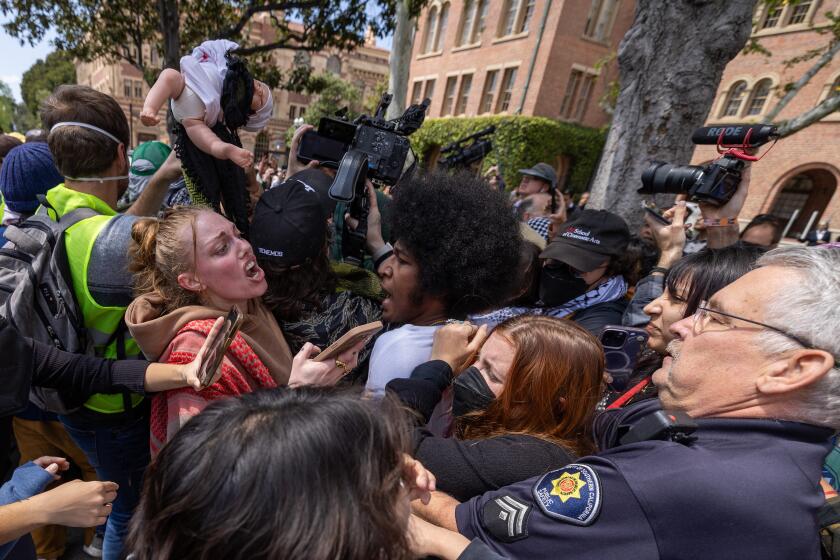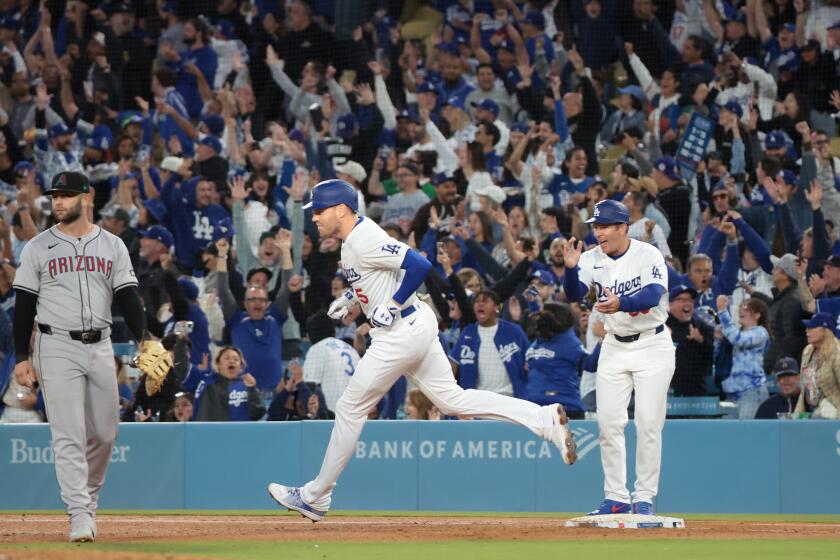Baseball’s Comet : Few Pitchers Have Had a Season Like Smoky Joe in 1912
Can I throw harder than Joe Wood? Listen, my friend, there’s no man alive can throw harder than Smoky Joe Wood. --Walter Johnson, in 1912 America lost its oldest big leaguer last Saturday. Smoky Joe Wood was 95 when he died in West Haven, Conn.
Joe Wood.
He passes across America’s baseball history pages like a comet, dropping from sight as quickly as he appeared. Wood’s year was 1912. Some baseball historians say that no pitcher ever had a season like Joe Wood had in 1912.
Pitching for the Boston Red Sox, Wood had a 34-5 record and a 1.91 earned-run average, threw 10 shutouts and won three more games in the World Series. Then, in a twinkling, at 22, it was over.
At spring training in 1913, he slipped on wet grass, fell on his right thumb and broke it. When it healed, he couldn’t pitch without pain in his right shoulder.
He pitched for three more seasons. On the evenings of days he had pitched, if he went to a movie, he had to lift his right arm onto the armrest with his left hand.
Still, from 1913 to 1915, he had records of 11-5, 9-3 and 15-5. The great fastball was gone, but even with a sore arm he never had an ERA higher than 2.62. In 1916, he laid off entirely, working on his father’s farm near Ness City, Kan. Doctors had advised him to rest his arm a full year.
Wood was in his mid-70s in the 1960s when he talked to Lawrence S. Ritter, who was writing “The Glory of Their Times,” a book about early century baseball stars.
“I must have gone to hundreds of doctors in three years, and nobody seemed able to help me,” Wood told Ritter. “Nowadays, a shot of cortisone would probably do the job in a flash, but that was over 50 years ago, you know.”
In 1917, with the help of his long-time Red Sox roommate, Hall of Fame center fielder Tris Speaker, Wood returned to baseball as an outfielder. Boston had released him, and he made a deal with Cleveland. He played in the Cleveland outfield for five seasons. In 1921, he hit .366 in 66 games.
In 1922, he became Yale University’s baseball coach, a position he held until 1942. Just last January, Wood, crying and in a wheelchair, was given an honorary degree by Yale.
A reporter who interviewed him in 1982 at his home not far from the Yale Bowl found him hard of hearing, but alert and physically active. When the reporter asked Wood, 92 at the time, about bandages on his right hand, he said that he’d fallen off his roof the day before, while trying to repair a leak.
Old-timers for decades campaigned for Wood to be inducted into the Hall of Fame. But his credentials rested largely on the strength of one great season, and he has never made it.
He emerged from an era when America’s little towns were connected by fierce rivalries of their beloved town teams, not by pavement.
In 1906, at 16, he was the star pitcher for a Ness City team that was the scourge of western Kansas. With Wood’s marvelous fastball the talk of the countryside, Ness City regularly conquered the likes of Scott City, WaKeeney, Bazine, Ellis, High Point and Ransom.
A team picture of the ’06 Ness City team survives, and is reproduced in “The Glory of Their Times.” Wood, who was 5 feet 11 inches and 180 pounds as a big leaguer, looked like a batboy at 16. Older men with mustaches towered over him.
But his fastball had such velocity it supposedly hissed as it rocketed over the plate. Reportedly, a hitter once suggested that Wood’s fastball hissed so loudly, it must have been starting to burn. Hence: Smoky Joe.
The following summer, he was pitching in the Western Assn., at Hutchinson, Kan., for $90 a month. By August, 1908, he was pitching for the Boston Red Sox, at 18.
In 1909, his record was 11-7. It was 12-13 in 1910, and jumped to 23-17, with a no-hitter, in 1911.
Then came 1912. He defeated Walter Johnson. In the World Series, he defeated Christy Mathewson. Few had ever seen a pitcher like Smoky Joe Wood.
He struck out 258 that season in an era when contact hitters, not power hitters, dominated. Babe Ruth was still in reform school.
Smoky Joe Wood’s best remembered game was a classic, a game men remembered all their lives. It occurred in the kind of matchup that hasn’t happened for more than half a century--a matchup of 30-game winners.
It was Sept. 6, 1912, at Boston’s brand new Fenway Park. Walter Johnson was having one of his great seasons. He would finish with a 32-12 record, a 1.39 ERA and 303 strikeouts. In one stretch, he won 16 in a row.
But Smoky Joe Wood had won 13 straight when Washington came to Boston that day.
It was the most publicized, most anticipated matchup of the year in the American League, perhaps of the decade. A Boston paper compared their biceps, thigh and forearm measurements.
In those days, fans could wander the playing field during pregame warmups. In a photo in “The Glory of Their Times,” hundreds of men formed a human corridor to watch Wood’s warmup pitches. They loved their young man from Kansas.
Wood won, 1-0. Consecutive doubles in the sixth inning by Speaker and Duffy Lewis were the difference. All of Boston cheered.
Another teammate of Wood’s, Harry Hooper, an American League outfielder from 1908 to 1925, told Ritter: “That was probably the most exciting game I ever played in or saw.”
Wood was the best, Hooper told Ritter in the 1960s. “I’ve seen a lot of great pitching in my lifetime, but never anything to compare with him in 1912,” he said.
Wood couldn’t have known it, but with his third victory over the New York Giants in the 1912 World Series, he was tumbling through the neck of the hourglass.
Minutes remained. But wait. Enjoy it with him, just for a moment. Share it. Imagine, being a World Series hero in Boston, in 1912.
At 22, in a tumultuous parade through the streets of Boston, Smoky Joe Wood rode in an open car next to John F. Kennedy’s grandfather, Boston Mayor John F. Fitzgerald.
The crowd cheered him mightily and shouted his name. Bands played. The parade rolled on, and young boys ran to keep up.
So long ago. Surely, for a little bit of every day he lived after that day, Smoky Joe Wood rode again in that parade. Surely, through the fog of too many years, he remembered it as one remembers a beautiful sunset.
Perhaps, too, he remembered how important it had been to beat the team from down the road, when he was 16 and throwing bullets for Ness City.
SMOKY JOE WOOD’S PITCHING STATISTICS
GP IP H BB SO W-L PCT. ERA 1912 43 344 267 82 258 34-5 .872 1.91 Career 225 1434 1138 421 989 114-69 .623 2.03
More to Read
Get our high school sports newsletter
Prep Rally is devoted to the SoCal high school sports experience, bringing you scores, stories and a behind-the-scenes look at what makes prep sports so popular.
You may occasionally receive promotional content from the Los Angeles Times.






